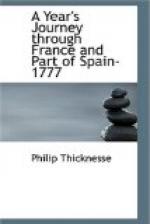The rapid water at this town, which I had passed going into Spain, was now lower than usual. Here too my horse, as well as his master, lived truly in clover; and though our habitation was humble, a habitation at the very foot of the Pyrenees could not but be very beautiful; no part of France is more so; it is indeed a beautiful and noble sight, to see the hanging plantations of vines, olives, and mulberry-trees, warmed by a hot sun on the sides of those mountains, the upper parts of which are covered with a perpetual snow. But beautiful as all that part of the country is, there was not a single gentleman’s house in the environs.
After a compleat week’s refreshment, we proceeded to Perpignan to spend our Christmas, where we found the Chevalier de Maigny and his Lady, who had given us the letter of recommendation to the French Consul at Barcelona; who shewed us those marks of civility and politeness, French officers in general shew to strangers. There we staid a fortnight; and Mons. de Maigny got me a considerable profit, in changing my Spanish gold for French.
In this town, I found an unfortunate young Irishman; he had been there three months, without a friend or a shilling in his pocket; and as he was a man of education and good breeding, I could not so soon forget my own situation at Barcelona, not to pity his: but what most induced me to assist him a little, was, what he feared might have had a contrary effect. When I asked him his name, he readily answered, “R—h; an unfortunate name!” said he;—“but, as it is my name, I will wear it.”—He had a well-wisher in the town, a French watch-maker, to whom he imparted the little kindness I had shewn him; and as it was not enough to conduct him on foot to the north side of this kingdom, the generous, but poor watch-maker, gave him as much as I had done, and he sat off with a light heart, though a thin pair of breeches, for his own country. He had been to visit a rich relation at Madrid; and, I believe, did not meet with so cordial a reception there as he expected.
At this town I drank, at a private gentleman’s house, part of a bottle of the wine made at a little village hard by, called Rios Alto; the most delicious wine I ever tasted: but as the spot produces but a small quantity, that which is really of the growth is very scarce, as well as dear: it has the strength of full port, with a flavour superior to burgundy.
Perpignan is the principal city of Rosillein; it is well fortified, but the works are in a ruinous condition: the streets are narrow and dirty, but the Governor’s, and the botanic gardens are worthy of notice: the climate is remarkably fine, and the air pure. The Pyrenees, which are at least fifteen miles distant, appear to hang in a manner over the town: to see so much snow, and feel so much sun, is very singular. Wood is very scarce and dear in that town: I frequently




